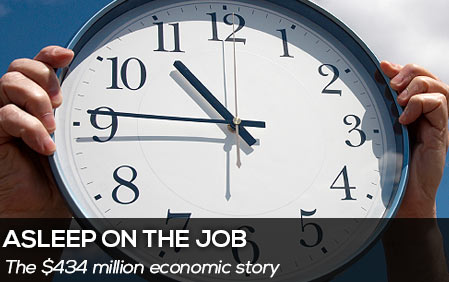British poet Ralph Hodgson wrote, “Time, you old gypsy man, will you not stay? Put up your caravan just for one day.” Time does have a way of getting away from us. And in the spring, most of us dread the day when we will “lose an hour.” I’m talking about Daylight Saving Time and changing our clocks on March 9 so we can “spring forward” on March 10.
That phrase was coined to help us remember whether to set our clocks ahead or back in March. But it’s surely not descriptive of the response most people have to losing an hour of sleep; rather than springing forward, we’re likely to be dragging our wagon.
The physiological processes of living beings – plants and animals – are regulated by our circadian rhythm, a roughly 24-hour cycle. Even small disruptions in one’s circadian rhythm can have measurable adverse affects, such as increasing the chances of cardiovascular events, neurological problems, and accidents – both on the road and in the workplace.
Numerous studies have been conducted to examine the effects sleep loss in general. In 1999, the U.S. National Commission on Sleep Disorders commissioned a study to determine the direct cost of accidents which result from sleep debt. The estimated total economic cost of sleep deprivation in the U.S. was over $56 billion, including $37.9 billion for motor vehicle accidents caused by sleepy drivers, $13.4 billion for work-related accidents caused by sleepiness, and $1.3 billion for falls and similar accidents in public places.
Narrowing the focus just to sleep loss due to Daylight Saving Time, one study, entitled “Estimating the Economic Loss of Daylight Saving Time for U.S. Metropolitan Statistical Areas,” estimated that the economic loss to this country due to DST was nearly $434 million.
Another study published by the Journal of Applied Psychology in 2009 used injury data from the U.S. Department of Labor and Mine Safety and Health Administration to show that the March switch to Daylight Savings Time resulted in 40 minutes less sleep for American workers, a 5.7 percent increase in workplace injuries and nearly 68 percent more work days lost to injuries.
The increased risk of injury is found especially in jobs requiring a high level of attention to detail or in hazardous or potentially dangerous environments. Construction workers, machine operators, fishermen, pilots, farmers, roofers, and truck drivers are among those whose occupations, even under the best of conditions, are hazardous. On Monday, March 10, 2014, we are likely to see a spike in reported accidents for these workers.
In South Carolina, most employers are required to provide workers’ compensation to their employees. Regardless of who was at fault for the injury, workers’ compensation pays 100% of injured workers’ medical bills, as well as two-thirds of their normal wages during the time when injuries keep them out of work. At times, however, employers try to get out of paying an injured person what they’re due. At Louthian Law, we have been serving injured South Carolinians since 1959; we understand how workers’ compensation law works and can help you collect the money you’re entitled to, so you can concentrate on getting better and going back to work.
We’re going to forgo our Sunday afternoon nap on March 9, go to bed early, spring forward on Monday, March 10, and drive very carefully to the office. If you fall asleep on the road or at work and have a DST accident, call us – we’ll be wide awake and ready to help you. Call us at (803) 454-1200 or fill out our online form.
 South Carolina Lawyer Blog
South Carolina Lawyer Blog


